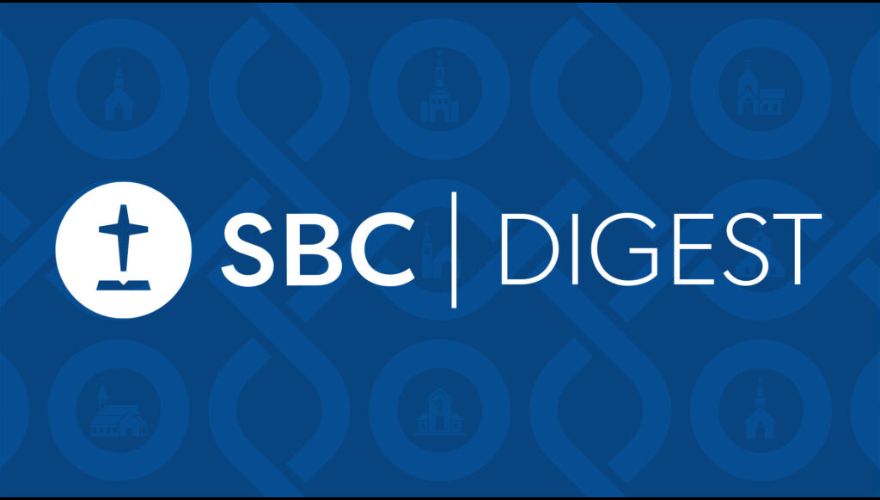
Lifeway employees donate $70K to Nashville Rescue Mission
By Myriah Snyder, Lifeway
MURFREESBORO, Tenn. — When Lifeway Christian Resources employees met for their biannual One Lifeway gathering on Tuesday, Sept. 24, the company presented a $70,000 check to the Nashville Rescue Mission (NRM).
NRM’s goal is to provide “hope for today, hope for tomorrow, and hope for eternity to those who are hungry, hurting, and experiencing homelessness.” This year, NRM is celebrating 70 years of service and operations. The ministry’s initial focus was serving men by providing clothing, food and shelter, but it was able to expand its reach to women and children in 1968.
The $70,000 gift was provided by Lifeway’s Better Together Project, a financial and service-related initiative focused on meeting needs in Nashville and beyond. The check was presented to Mike Cowles, director of major gifts for NRM. Lifeway employees have now donated more than $215,000 to the NRM since 2018.
Lifeway employees can voluntarily designate a portion of their paycheck toward the Better Together Project and selected charitable endeavors. Sixty percent of the fund is allocated to the NRM, while 20% funds mission work and 20% supports employees and retirees in need.
Speaking to Cowles at the One Lifeway gathering, Lifeway President and CEO Ben Mandrell shared his gratitude that employees could “have this opportunity to give our money to help you guys do what you need to do to pay your bills, build the things you need to build and continue to move forward.”
In addition to financial contributions, Lifeway provides opportunities for teams and individuals to directly volunteer at NRM. Over the last few years, Lifeway teams and individuals have volunteered 1,800 hours and helped serve more than 38,000 meals to those in need. Additional opportunities for service and connection between the two organizations are in development.
Earlier this year, Mandrell encouraged Lifeway employees to continue partnering with NRM. He said there’s a 47% increase in the number of women and a 76% increase in the number of children needing shelter in the past year. For the first time, women and children outnumber men at NRM.
Cowles echoed the great need the mission has and his gratitude for this partnership. In 2024, NRM opened a facility to house 350 women and children. “We’re actually over capacity right now,” he said. “But God is providing for us. We’re able to serve everyone that comes to us. In addition to those women and children, the NRM serves over 500 men suffering from homelessness daily.
“While that is a terrible number to have, it is such a blessing to be able to do that for folks, because any of us sitting in this room today could be in that position,” Cowles told employees at the One Lifeway gathering.
“I wish that homelessness was cured, and we were out of business,” he continued. “But that’s not the case. And so, the folks like you that take the time to volunteer with us and give your treasure to us is just amazing.”
MBTS holds ‘Being Baptist’ panel discussion
By Michaela Classen, MBTS
KANSAS CITY, Mo. (BP) — Southwestern Baptist Theological Seminary (SWBTS) President David Dockery and Blue Valley Church Pastor Derrick Lynch joined the Midwestern Baptist Theological Seminary (MBTS) community for a special chapel service on “Being Baptist” Oct. 2. Led by MBTS President Jason Allen, the conversation also featured Midwestern Seminary professors Geoff Chang, Todd Chipman and Thomas Kidd.
The conversation explored Baptist beliefs, key events in Southern Baptist history, and the panelists’ personal reasons for Baptist convictions, highlighting how Baptist distinctives have contributed to the growth of healthy churches and global missions over the last century.
Introducing the panelists, Allen expressed his welcome and appreciation for special guests Dockery and Lynch, adding, “Every one of these individuals is here because of their knowledge, their experience and their contributions to the conversation.”
The conversation began with each panelist sharing how he became a Baptist, several of them noting the influence of studying Scripture in young adulthood.
Dockery, for example, shared, “I had the wonderful privilege of growing up in a Southern Baptist context back in the heyday of Baptist programming. It was a terrific formation for me, something that I’ll never forget, and something for which I’m always grateful.”
After going on to study the beliefs of various denominations during seminary, Dockery realized, “not only was I a Baptist by upbringing; I was a Baptist by conviction,” he said.
The conversation then turned to what makes Baptists distinct. Chang noted that Baptists hold to historic Christian orthodoxy, the Protestant doctrines of the authority of Scripture and justification by faith and congregational local church government.
Defining congregationalism, Chang said, “When we look at the New Testament, when it comes to matters of church discipline, bringing people into membership, even the elected leaders, these things are done by the congregation under the rule of Christ, and really what that is conveying is that because Christ rules over the church, we each follow His leadership.”
Chipman also addressed the Baptist distinctive of regenerate church membership and its importance for the life of the congregation, saying, “If we don’t have a common spirit in us, it’s very difficult to have any kind of cooperation.”
He continued, “Regeneration is an experience, the indwelling of the Spirit, and a mindset. And that common mindset is necessary when we come to Scripture, when we think about missions, life together and ethics.”
Reflecting on his experience of congregationalism in Southern Baptist churches, Lynch added, “I think the chief benefit of congregationalism, that I have been able to witness when it works well, is that there is an investment by the people in the fulfilling of the Great Commission in that church.”
The panelists went on to discuss the Baptist distinctive of religious liberty, noting its value for faithful religious practice. Kidd described how the government persecutions of colonial-era English and American Baptists have led Baptists to oppose government involvement in religion.
To watch the full panel discussion, click here.

